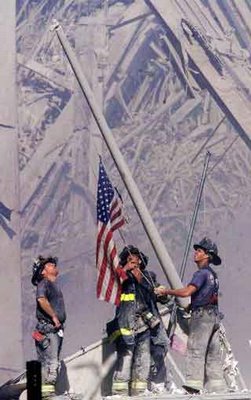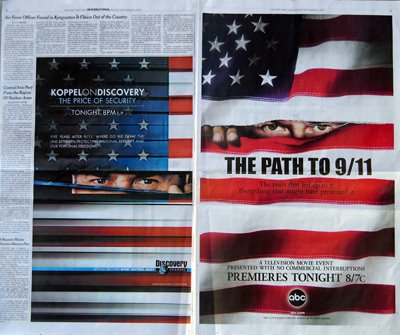 Of all the visual images that define 9/11 and its aftermath, one grew so ubiquitous as to become symbolic: the American flag. The image pictured above zoomed around the country via e-mail and the internet in the days following the 9/11 attacks. Stores couldn't keep American flags in stock, and manufacturers couldn't make new flags fast enough. Car windows across the country sported miniature American flags flapping in the breeze of rush hour traffic. And remember New York’s Finest parading the tattered American flag around Yankee Stadium during the World Series? Even the burliest sports fans couldn’t restrain their tears.
Of all the visual images that define 9/11 and its aftermath, one grew so ubiquitous as to become symbolic: the American flag. The image pictured above zoomed around the country via e-mail and the internet in the days following the 9/11 attacks. Stores couldn't keep American flags in stock, and manufacturers couldn't make new flags fast enough. Car windows across the country sported miniature American flags flapping in the breeze of rush hour traffic. And remember New York’s Finest parading the tattered American flag around Yankee Stadium during the World Series? Even the burliest sports fans couldn’t restrain their tears. Illustrating the iconic power of the flag as a symbol of this momentous event, the center spread of today’s New York Times bears two full-color ads from two competing networks, the Discovery Channel and ABC. Each ad advertises a show about 9/11 that will appear in the same time slot: 8 p.m. EDT tonight, the 5th anniversary of 9/11.
At first glance on a sleepy Sunday morning, I suspect many readers didn’t realize the ads came from competing television shows. I know I didn’t. They are nearly identical.
 This weird juxtaposition poses a number of questions:
This weird juxtaposition poses a number of questions:Did one network’s ad agency steal the idea of from the other? Darned unlikely. I worked on the creative side of advertising for many years where I learned that agency creatives want, perhaps more than life itself, to distinguish their work.
Did the two networks actually desire association with each other’s shows? With competing media ownership, competing time slots, and a firestorm of controversy surrounding ABC’s 9/11 docudrama, it’s highly doubtful that either network wants any association with the other.
What miscommunication within one of America's largest newspapers caused these two competing ads to face each other? On the center spread of the front section of the Sunday edition, no less? I can't even venture a guess; in fact, I suspect that at this moment frantic phone calls are crisscrossing the continent as television network, agency and newspaper executives attempt to unravel the bizarre coincidence.
Then again, was it a coincidence?
Now, this isn't a rhetorical question, nor do I pose it to imply conspiracy. One of the most intriguing aspects of creative thinking lies in how often ideas are replicated among people who have no conceivable contact with one another. For example, in his book, The Hero With a Thousand Faces, Josepth Campbell demonstrates that a version of the hero myth appears in almost every culture on earth.
The fact that that two separate sets of creative teams, who had no inkling of each other’s approach, came up with a nearly identical concept illustrates more clearly than any TV commentator or editorial writer could how far America has come as a nation since September 11, 2001.
The images in these ads transform 9/11's most noble symbol into a mask of subterfuge, and their replication poses one last set of questions: Editorial writers and TV commentators said 9/11 would change everything, and it certainly changed a lot of things in our country -- airport security, the war in Iraq and the skyline of New York City to name just a few. But did 9/11 change us as people? If so, how? Are we better, or just more suspicious? Do you think it changed you?
September 11 American flag media media criticism
2 comments:
I think this is a great post on 9/11, many I've read today are sentimental tributes and thoughts, which are nice, but your challenges us to reexamine 9/11 and it's true and deepening affects. I think that 9/11 has been successful from the terroists point of view to the effect that it's still working. We're still terrorized and fearful of attacks. I remember reading about how there's less crime in Canada and one theory was that their media didn't hammer them with one devastating horrible story after another and they were less afraid there. Does fear breed violence? Absolutely! Has our media done us a disservice and done the terrorists a service by keeping Americans afraid - as I feel the ads you pointed out to displays this fear and suspicion perfectly - in my opinion, yes.
Great thoughtful post on this sad day remember how we were terrorized and continue to be terrorized, but only by our own government and media.
Fascinating, Mai Wen. I hadn't heard about the Canadian theory before, but I'll bet there's truth to it. The trouble is, we're ALL affected by the media in America. Even those who rarely watch the news or read the papers are affected by those of us who do.
I tried one year to escape it and studiously avoided news, radio and TV. That was the year of OJ Simpson's wife's murder. Somehow, no matter how hard I tried, I knew all about it. Why? Someone would always tell me!
I definitely think the media influences us far, far more than we realize, and the media viewpoint is just that: one viewpoint. Rarely, does the media tell the whole story.
One example: during Katrina all we heard about were that hospitals were flooded and couldn't evacuate and people were dying. And yet there were three hospitals open, fully functioning and accepting patients. But those hospitals couldn't get the word out to the public that they were open, because all the media wanted to report was news about the hospitals that were devastated. One of the hospitals ended up taping red plastic bags on top of their roof shaped into the word "OPEN" so that at least the evac helicopters could see it. It was the only way they could tell the public they were there to care for injured and ill patients.
My favorite example: Presidential speeches. I used to just read what the newspapers and TV commentators said about the President's speeches. Then one day, I actually read a whole speeech. Funny, much that the President said never appeared in the media, anywhere. Try it sometime, you'll be amazed!
And don't even get me started about TV docudramas!
Don't get me wrong, I think the media performs an important function in America and thank heavens we have a free media. But it's really important to be discerning, thoughtful and critical whenever we encounter the media.
Post a Comment